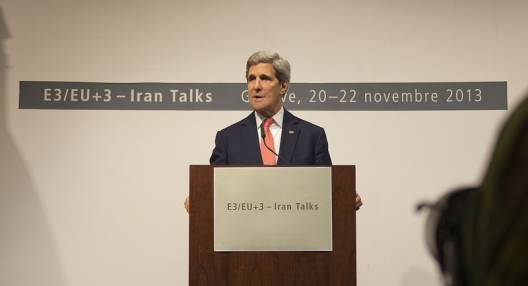 The ink was not dry on the historic Geneva nuclear accord with Iran before Israeli Prime Minister Benjamin Netanyahu denounced it as a “historic mistake” that would allow Iran to cheat and get closer to nuclear weapons.
The ink was not dry on the historic Geneva nuclear accord with Iran before Israeli Prime Minister Benjamin Netanyahu denounced it as a “historic mistake” that would allow Iran to cheat and get closer to nuclear weapons.
Netanyahu may have been doing Iran a favor. By criticizing the deal so harshly, he will make it easier for Iranian officials to assert to their hardliners that the agreement, which pauses Iran’s nuclear advances and rolls back some of the program in return for modest sanctions relief, was a victory for the Islamic Republic.
In the zero-sum politics of the Middle East, what’s good for your enemy is invariably considered bad for you. Yet the deal announced early Sunday European time has much that is useful for Iran, the United States, the international community writ large and yes, Israel too.
If implemented, it will push Iran farther from the ability to “break out” quickly from the nuclear Non-Proliferation Treaty. Even though low-level uranium enrichment will continue, Iran has pledged not to stockpile it and to stop refining uranium to 20 percent U-235 – very close to weapons grade. Iran will convert the 200 kilograms of 20 percent uranium it has amassed to a form that cannot be easily enriched further. The deal will also freeze most work at a heavy water reactor called Arak that if completed, could yield plutonium, another potential bomb fuel. And it will provide the International Atomic Energy Agency with unprecedented daily access to Iranian enrichment plants as well as potential answers to questions about alleged past weapons research at military sites. All of this has long been sought by the international community in vain.
In return, the Iranians will get about $7 billion in sanctions relief – most of it their own oil earnings which have been frozen abroad — the right to continue to export oil at a current reduced level to Asian clients and facilitated humanitarian transactions including imports of food and medicine and a means to support Iranian students abroad, including 8,000 in the US. The United States, European Union and UN Security Council also pledge not to pass new nuclear-related sanctions against Iran for the six-month duration of the interim deal. During this time, Iran and the five permanent members of the UN Security Council plus Germany (the P5+1) are to negotiate a comprehensive agreement that will cap the Iranian nuclear program in return for recognition of Iran’s right to peaceful uses of nuclear energy and the lifting of all nuclear-related sanctions.
Iran will still remain under US sanctions for the foreseeable future for its support of groups such as Hezbollah which the US regards as terrorist and for abusing the human rights of the Iranian people. European sanctions related to those areas will also remain in place. But the nuclear agreement is an entry point into further discussions that could lead to a more constructive Iran externally and a less authoritarian regime at home.
As I wrote in August the election of Iranian President Hassan Rouhani was a bright spot in an otherwise bloody Middle East and presented President Barack Obama with the potential for a positive foreign policy legacy. Rouhani, who marks his 100thday in office on Nov. 26 – he counts from the day his cabinet was seated – desperately needed a nuclear deal to fulfill his campaign promises to ease the burden of sanctions on the Iranian people. But to sign a deal, Rouhani had to be able to say that Iran’s rights had been respected and that Iran had not given too much away too soon. For Obama, the same equation applied.
It is easy for Israeli, Arab and congressional critics to complain that the agreement does not “dismantle” Iran’s nuclear infrastructure but the maximalist deal that would have satisfied these hardliners was simply not obtainable in a first phase. Supreme Leader Ayatollah Ali Khamenei gave Rouhani and his talented negotiating team “heroic flexibility” to reach an agreement, not carte blanche. Rouhani was not going to be able to stop all uranium enrichment because he was heavily criticized by Iranian hardliners for suspending parts of the program from 2003-2005 – when the George W. Bush administration sat on the sidelines and Europeans negotiated with Iran – and getting very little in return. (It is not true, as critics have charged, that Rouhani “cheated” so Iran could continue other nuclear work; his agreement with the Europeans suspended only the enrichment program.)
The next few months will show whether Iran – and the United States and its partners – can fulfill their promises – which will require that domestic opposition hold its fire. If the deal works, the prospect for another Middle East war and all the horror that entails will recede, the US and Iran can begin to repair a breach of 34 years and there could be benefits for tamping down the conflict in Syria as well. Indeed on Monday, UN Secretary General Ban Ki Moon announced via Twitter that a long-sought Geneva conference on Syria will be held Jan. 22.
Rather than try to sabotage the nuclear agreement, detractors should test Iran’s compliance. Netanyahu and other critics may find it psychologically uncomfortable to reappraise a long-time enemy, but the upside could be tremendous – and not just for the Israeli stock market which hit a record high on Sunday.
Barbara Slavin is a senior fellow with the South Asia Center.
Image: US Secretary of State John Kerry addresses reporters and takes some of their questions during a news conference in Geneva, Switzerland, on November 24, 2013, after the P5+1 member nations concluded negotiations with Iran about its nuclear capabilities. (Photo:State Department/Public Domain)
